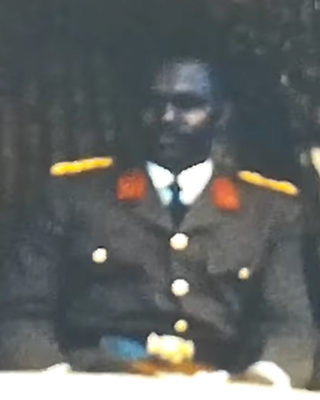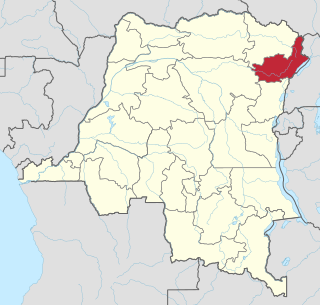Related Research Articles

Burundi originated in the 16th century as a small kingdom in the African Great Lakes region. After European contact, it was united with the Kingdom of Rwanda, becoming the colony of Ruanda-Urundi - first colonised by Germany and then by Belgium. The colony gained independence in 1962, and split once again into Rwanda and Burundi. It is one of the few countries in Africa to be a direct territorial continuation of a pre-colonial era African state.
Human occupation of Rwanda is thought to have begun shortly after the last ice age. By the 11th century, the inhabitants had organized into a number of kingdoms. In the 19th century, Mwami (king) Rwabugiri of the Kingdom of Rwanda conducted a decades-long process of military conquest and administrative consolidation that resulted in the kingdom coming to control most of what is now Rwanda. The colonial powers, Germany and Belgium, allied with the Rwandan court.
The Hutu, also known as the Abahutu, are a Bantu ethnic group which is native to the African Great Lakes region. They mainly live in Rwanda, Burundi, and Uganda where they form one of the principal ethnic groups alongside the Tutsi and the Great Lakes Twa.
The Tutsi, also called Watusi, Watutsi or Abatutsi, are an ethnic group of the African Great Lakes region. They are a Bantu-speaking ethnic group and the second largest of three main ethnic groups in Rwanda and Burundi.

Michel Micombero was a Burundian military officer and politician who ruled the country as de facto military dictator for the decade between 1966 and 1976. He was the last Prime Minister of the Kingdom of Burundi from July to November 1966, and the first President of the country from November 1966 until his overthrow in 1976.

The Rwandan genocide, also known as the genocide against the Tutsi, occurred from 7 April to 19 July 1994 during the Rwandan Civil War. Over a span of around 100 days, members of the Tutsi ethnic group, as well as some moderate Hutu and Twa, were systematically killed by Hutu militias. While the Rwandan Constitution states that over 1 million people were killed, most scholarly estimates suggest between 500,000 and 662,000 Tutsi died. The genocide was marked by extreme violence, with victims often murdered by neighbors, and widespread sexual violence, with between 250,000 and 500,000 women raped.

The Burundian Civil War was a civil war in Burundi lasting from 1993 to 2005. The civil war was the result of longstanding ethnic divisions between the Hutu and the Tutsi ethnic groups. The conflict began following the first multi-party elections in the country since its independence from Belgium in 1962, and is seen as formally ending with the swearing-in of President Pierre Nkurunziza in August 2005. Children were widely used by both sides in the war. The estimated death toll stands at 300,000.
Banyamulenge is a community that lives mainly in South Kivu province. The Banyamulenge are culturally and socially distinct from the Tutsi of South Kivu, with most speaking Kinyamulenge, a mix of Kinyarwanda, Kirundi, Ha language, and Swahili. Banyamulenge their role in Mobutu's war against and victory over the Simba Rebellion, which was supported by the majority of other tribes in South Kivu, their role during the First Congo War and subsequent regional conflicts (Rally for Congolese Democracy–Goma, Movement for the Liberation of the Congo, National Congress for the Defence of the People, and more importantly for the fact that two of the most influential presidents of their country declared them as enemy of the State both in 1996 and 1998.

The Hema people or Bahema (plural) are a Bantu ethnic group who are concentrated in parts of Ituri Province in the eastern Democratic Republic of the Congo.

The Kingdom of Burundi, also known as Kingdom of Urundi, was a Bantu kingdom in the modern-day Republic of Burundi. The Ganwa monarchs ruled over both Hutus and Tutsis. Created in the 16th century, the kingdom was preserved under German and Belgian colonial rule in the late 19th and early 20th century and was an independent state between 1962 and 1966.

Mass killings of Tutsis were conducted by the majority-Hutu populace in Burundi from 21 October to December 1993, under an eruption of ethnic animosity and riots following the assassination of Burundian President Melchior Ndadaye in an attempted coup d'état. The massacres took place in all provinces apart from Makamba and Bururi, and were primarily undertaken by Hutu peasants. At many points throughout, Tutsis took vengeance and initiated massacres in response.
The Banyarwanda are a Bantu ethnolinguistic supraethnicity. The Banyarwanda are also minorities in neighboring DR Congo, Uganda and Tanzania.
The origins of the Hutu, Tutsi and Twa peoples is a major issue of controversy in the histories of Rwanda and Burundi, as well as the Great Lakes region of Africa. The relationship among the three modern populations is thus, in many ways, derived from the perceived origins and claim to "Rwandan-ness". The largest conflicts related to this question were the Rwandan genocide, the Burundian genocide, and the First and Second Congo Wars.

Racism in Africa has been a recurring part of the history of Africa.

Burundi, officially the Republic of Burundi, is a landlocked country in the Great Rift Valley at the junction between the African Great Lakes region and Southeast Africa, with population of over 14 million people. It is bordered by Rwanda to the north, Tanzania to the east and southeast, and the Democratic Republic of the Congo to the west; Lake Tanganyika lies along its southwestern border. The capital city is Gitega and the largest city is Bujumbura.

Ethnic groups in Burundi include the three main indigenous groups of Hutu, Tutsi and Twa that have largely been emphasized in the study of the country's history due to their role in shaping it through conflict and consolidation. Burundi's ethnic make-up is similar to that of neighboring Rwanda. Additionally, recent immigration has also contributed to Burundi's ethnic diversity. Throughout the country's history, the relation between the ethnic groups has varied, largely depending on internal political, economic and social factors and also external factors such as colonialism. The pre-colonial era, despite having divisions between the three groups, saw greater ethnic cohesion and fluidity dependent on socioeconomic factors. During the colonial period under German and then Belgian rule, ethnic groups in Burundi experienced greater stratifications and solidification through biological arguments separating the groups and indirect colonial rule that increased group tensions. The post-independence Burundi has experienced recurring inter-ethnic violence especially in the political arena that has, in turn, spilled over to society at large leading to many casualties throughout the decades. The Arusha Agreement served to end the decades-long ethnic tensions, and the Burundian government has stated commitment to creating ethnic cohesion in the country since, yet recent waves of violence and controversies under the Pierre Nkurunziza leadership have worried some experts of potential resurfacing of ethnic violence. Given the changing nature of ethnicity and ethnic relations in the country, many scholars have approached the topic theoretically to come up with primordial, constructivist and mixed arguments or explanations on ethnicity in Burundi.

The Ikiza, or the Ubwicanyi (Killings), was a series of mass killings—often characterised as a genocide—which were committed in Burundi in 1972 by the Tutsi-dominated army and government, primarily against educated and elite Hutus who lived in the country. Conservative estimates place the death toll of the event between 100,000 and 150,000 killed, while some estimates of the death toll go as high as 300,000.
Thaddée Siryuyumunsi was a Burundian politician who served as President of the National Assembly from 1961 to 1965.
The Kamenge incidents or Kamenge riots were a series of armed raids and murders conducted in the Kamenge quarter of Bujumbura, Burundi in January 1962. They were perpetrated by militants of the Jeunesse Nationaliste Rwagasore against Hutu leaders of the Syndicats Chrétiens trade union and the Parti du Peuple. The Kamenge incidents were the first major instance of ethnic violence in modern Burundi.

Relations between Burundi and Rwanda have existed for at least as long as the states themselves. Before contact with Europeans, Rwanda and Burundi were kingdoms competing to gain control over nearby territory. In the 1880s, the two kingdoms were placed under colonial authority, first by Germany, and then by Belgium after 1919.
References
- ↑ Longman, Timothy (2010). Christianity and Genocide in Rwanda. ISBN 978-0-521-19139-5.
- ↑ Civil Wars of the World: Major Conflicts Since World War II, Volume 1 page 205
- ↑ "Identity, politics, and economics in the East African Community's most troubled member". Archived from the original on 2015-02-22. Retrieved 2015-05-21.
- ↑ Scherrer, Christian P. (2002). Genocide and Crisis in Central Africa: Conflict Roots, Mass Violence and Regional War. ISBN 0-275-97224-0.
- ↑ On Vansina's Le Rwanda Ancien:Three commentaries. p. 153.
- ↑ Croyances et Pratiques Religieuses des Barundi.
- ↑ Us” and “them”: reciprocal perceptions and interactions between amoko in contemporary Burundi.